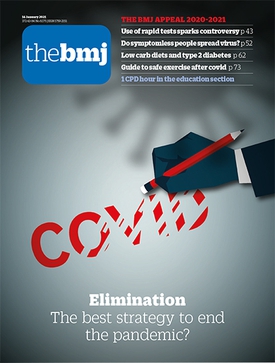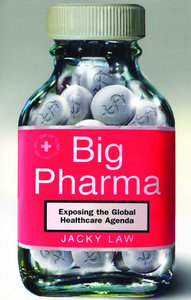Related Research Articles

The BMJ is a weekly peer-reviewed medical journal, published by BMJ Group, which in turn is wholly-owned by the British Medical Association (BMA). The BMJ has editorial freedom from the BMA. It is one of the world's oldest general medical journals. Previously called the British Medical Journal, the title was officially shortened to BMJ in 1988, and then changed to The BMJ in 2014. The journal is published by BMJ Publishing Group Ltd, a subsidiary of the British Medical Association (BMA). The current editor-in-chief of The BMJ is Kamran Abbasi, who was appointed in January 2022.

Nalidixic acid is the first of the synthetic quinolone antibiotics.

The Maudsley Hospital is a British psychiatric hospital in south London. The Maudsley is the largest mental health training institution in the UK. It is part of South London and Maudsley NHS Foundation Trust, and works in partnership with the Institute of Psychiatry, King's College London. The hospital was one of the originating institutions in producing the Maudsley Prescribing Guidelines. It is part of the King's Health Partners academic health science centre and the National Institute for Health and Care Research (NIHR) Biomedical Research Centre for Mental Health.

Robert Evan Kendell, was a British psychiatrist. He was Chief Medical Officer of Scotland 1991−96 and President of the Royal College of Psychiatrists 1996−99.

Big Pharma: How the World's Biggest Drug Companies Control Illness is a 2006 book by British journalist Jacky Law. The book examines how major pharmaceutical companies determine which health care problems are publicised and researched.

The Croonian Medal and Lecture is a prestigious award, a medal, and lecture given at the invitation of the Royal Society and the Royal College of Physicians.

Paul D. Thacker is an American journalist who reports on science, medicine, and the environment. He was a lead investigator of the United States Senate Committee on Finance for Senator Chuck Grassley, where he examined financial links between physicians and pharmaceutical companies.

Amiphenazole (Daptazile) is a respiratory stimulant traditionally used as an antidote for barbiturate or opiate overdose, usually in combination with bemegride, as well as poisoning from other sedative drugs and treatment of respiratory failure from other causes. It was considered particularly useful as it could counteract the sedation and respiratory depression produced by morphine but with less effect on analgesia. It is still rarely used in medicine in some countries, although it has largely been replaced by more effective respiratory stimulants such as doxapram and specific opioid antagonists such as naloxone.

Sir Frederick Walker Mott was one of the pioneers of biochemistry in Britain. He is noted for his work in neuropathology and endocrine glands in relation to mental disorder, and consequently as a psychiatrist and social scientist. He was Croonian Lecturer to the Royal College of Physicians for the year 1900.
The Harveian Oration is a yearly lecture held at the Royal College of Physicians of London. It was instituted in 1656 by William Harvey, discoverer of the systemic circulation. Harvey made financial provision for the college to hold an annual feast on St. Luke's Day at which an oration would be delivered in Latin to praise the college's benefactors and to exhort the Fellows and Members of this college to search and study out the secrets of nature by way of experiment. Until 1865, the Oration was given in Latin, as Harvey had specified, and known as the Oratio anniversaria; but it was thereafter spoken in English. Many of the lectures were published in book form.
The Goulstonian Lectures are an annual lecture series given on behalf of the Royal College of Physicians in London. They began in 1639. The lectures are named for Theodore Goulston, who founded them with a bequest. By his will, dated 26 April 1632, he left £200 to the College of Physicians of London to found a lectureship, to be held in each year by one of the four youngest doctors of the college. These lectures were annually delivered from 1639, and have continued for more than three centuries. Up to the end of the 19th century, the spelling Gulstonian was often used. In many cases the lectures have been published.

The Lumleian Lectures are a series of annual lectures started in 1582 by the Royal College of Physicians and currently run by the Lumleian Trust. The name commemorates John Lumley, 1st Baron Lumley, who with Richard Caldwell of the College endowed the lectures, initially confined to surgery, but now on general medicine. William Harvey did not announce his work on the circulation of the blood in the Lumleian Lecture for 1616 although he had some partial notes on the heart and blood which led to the discovery of the circulation ten years later. By that time ambitious plans for a full anatomy course based on weekly lectures had been scaled back to a lecture three times a year.
The Raymond Horton-Smith Prize is a prize awarded by the School of Clinical Medicine, University of Cambridge for the best thesis presented for MD degree during the academical year. Known as the prize for the best MD of the year, it should be awarded annually but from time to time it has not been awarded for some years. Often the prize has been considered to have a high prestige value since it has encouraged the Doctor of Medicine graduates (MD) of the world-renowned university to write the best thesis among them.
The relationship between antidepressant use and suicide risk is a subject of medical research and has faced varying levels of debate. This problem was thought to be serious enough to warrant intervention by the U.S. Food and Drug Administration to label greater likelihood of suicide as a risk of using antidepressants. Some studies have shown that the use of certain antidepressants correlate with an increased risk of suicide in some patients relative to other antidepressants. However, these conclusions have faced considerable scrutiny and disagreement: A multinational European study indicated that antidepressants decrease risk of suicide at the population level, and other reviews of antidepressant use claim that there is not enough data to indicate antidepressant use increases risk of suicide.

Isabel Galloway Emslie, Lady Hutton CBE was a Scottish physician who specialised in mental health and social work.

Sheila Macdonald Bird OBE FRSE FMedSci is a Scottish biostatistician whose assessment of misuse of statistics in the British Medical Journal (BMJ) and BMJ series ‘Statistics in Question’ led to statistical guidelines for contributors to medical journals. Bird's doctoral work on non-proportional hazards in breast cancer found application in organ transplantation where beneficial matching was the basis for UK's allocation of cadaveric kidneys for a decade. Bird led the Medical Research Council (MRC) Biostatistical Initiative in support of AIDS/HIV studies in Scotland, as part of which Dr A. Graham Bird and she pioneered Willing Anonymous HIV Surveillance (WASH) studies in prisons. Her work with Cooper on UK dietary bovine spongiform encephalopathy (BSE) exposure revealed that the 1940–69 birth cohort was the most exposed and implied age-dependency in susceptibility to clinical vCJD progression from dietary BSE exposure since most vCJD cases were younger, born in 1970–89. Bird also designed the European Union's robust surveillance for transmissible spongiform encephalopathies in sheep which revolutionised the understanding of scrapie.
William Ivor Neil Kessel was a British psychiatrist with expertise in attempted suicide and alcoholism. He trained at the Maudsley Hospital under Sir Aubrey Lewis, before working with Michael Shepherd at the General Practice Unit. He moved to Edinburgh as part of G. M. Carstairs' unit on Psychiatric Epidemiology, and then on to the University of Manchester as a professor of Psychiatry where he was advisor on alcoholism to the Department of Health and Social Security (DHSS).
Margaret Angus Patterson MBE was a Scottish surgeon and medical missionary in India and Hong Kong. She claimed to be able to treat drug addiction using electric shocks, something she called "neuro-electric therapy" (NET). The reputation gained by NET was based on celebrity endorsements, but there is no evidence that it is an effective treatment.

John Haddon (1845–1924) was a Scottish physician, dietitian and vegetarianism activist.
The Huxley Lecture was a memorial lecture instituted by Charing Cross Hospital Medical School in 1896 to honour Thomas Henry Huxley and is delivered biennially. The Huxley Lecture was one of two memorial lectures created to honour Huxley. The other lecture series is known as The Huxley Memorial Medal and Lecture and was created in 1900 by the Royal Anthropological Institute of Great Britain and Ireland.
References
- ↑ Pop & Jazz: As though he had wings Independent
- ↑ Drugs policy: The 'British system' BBC News
- ↑ Heroin addiction care and control: the British System HB Speare 2002, page 148.
- ↑ Anonymous (1967-07-08). "Obituary Notices". British Medical Journal. 3 (5557): 116–117. doi:10.1136/bmj.3.5557.116. PMC 1842382 .
- ↑ "FRANKAU, Sir Claude (Howard Stanley)". Who Was Who. A & C Black. Retrieved 2010-08-22.
- ↑ "Supplement, January 1, 1945". The London Gazette . No. 36866. December 29, 1944. p. 2.
- ↑ "Forms of Address – Wife of a Knight". Debrett's . Retrieved 23 August 2010.
- ↑ Frederick W. Mott and Isabella McDougall Robertson (July 1923). "Histological Examination of the Pituitary Gland in 110 Asylum and Hospital Cases". BJPsych. 69 (286).
- ↑ Edward Mapother (1926-11-13). "British Medical Association Proceedings of Sections at the Annual Meeting, Nottingham, 1926". British Medical Journal. 2 (3436): 872–885. doi:10.1136/bmj.2.3436.872. PMC 2523649 .
- ↑ Michael Shepherd (1993). "Interview with Sir Aubrey Lewis" (PDF). Psychiatric Bulletin. 17 (12): 743. doi: 10.1192/pb.17.12.738 . In the transcription Sir Aubrey apparently refers to "the future Lady Frankau" as "Camilla Robertson" rather than "Isabella"
- ↑ Edgar Jones and Shahina Rahman (July 2009). "The Maudsley Hospital and the Rockefeller Foundation: The Impact of Philanthropy on Research and Training". J Hist Med Allied Sci. 64 (3): 273–299. doi:10.1093/jhmas/jrn065. PMC 2723762 . PMID 18996947.
- ↑ I. M. Frankau (November 13, 1943). "Acceleration of Muscular Effort by Nicotinamide". British Medical Journal. 2 (4323): 601–603. doi:10.1136/bmj.2.4323.601. PMC 2285375 . PMID 20785121.
- ↑ E. Lincoln Williams (December 1954). "The Management of the Chronic Alcoholic". Postgrad Med J. 30 (350): 626–30. doi:10.1136/pgmj.30.350.626. PMC 2501319 . PMID 13215184.
- ↑ "Medical News". British Medical Journal. 1 (4854): 165–166. January 16, 1954. doi:10.1136/bmj.1.4854.165. PMC 2084421 .